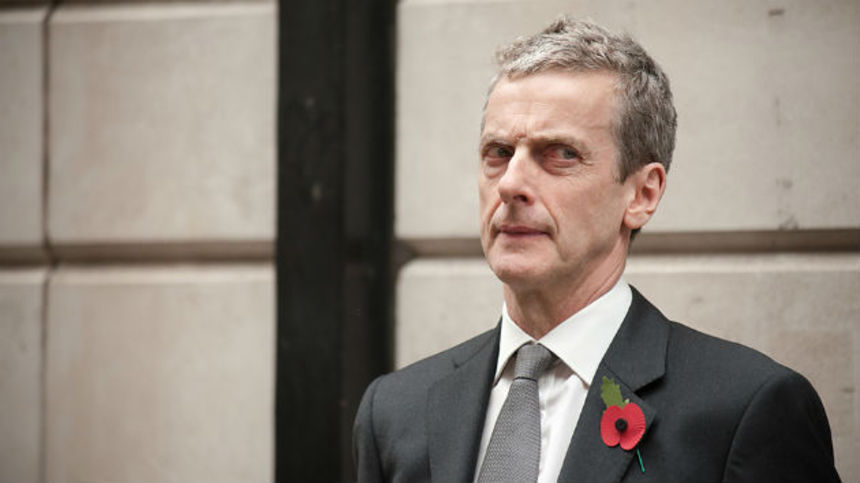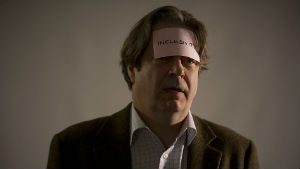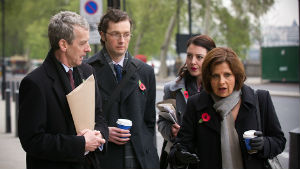Review: THE THICK OF IT Comes to a Brilliant Conclusion

How do you bring a brilliant show to a conclusion? Armando Iannucci and company answered that question -- brilliantly -- with the final episode of The Thick of It, a political comedy that tussled with social issues, the inanities of bureacracy, and the vagaries of the human condition with an insanely profane vocabulary and withering insight.
I confess that, as an American with little knowledge or more than a basic understanding of the British political system, the show has often baffled me, and I'm positive that I've missed a fair amount of the pointed humor. But that's never kept me from enjoying the show, and laughing out loud so many times that I quickly lost count. Each episode drops the viewer inside a tea kettle that feels comfortably warm, and then turns up the heat slowly. By the time the credits roll, you've been burned alive -- and it feels good.
That makes no sense, I know, yet it approximates the feeling I have whenever I try to figure out what makes the show so funny. Deconstructed, many of the "jokes" are nothing more than insults laced with nasty combinations of imaginative profanities; somehow, though, coming out of the mouths of these actors, each line sounds marvelously spontaneous. And that's one reason the show has worked so well: Iannucci encourages his cast members to contribute and credits them for "additional material."
Series 4 found the opposition party from Series 1-3 finally in power, though they are prone to the same foibles as everyone else. (Of course!) As I noted briefly in the past, my only real complaint with Episode 1 was the absence of media mastermind Malcolm Tucker (Peter Capaldi). Instead, the focus was on Peter Mannion (Roger Allam), now in charge of the Department of Social Affairs and Citizenship (DoSAC), and junior minister Fergus Williams (Geoffrey Streatfield).
Mannion and Williams bluster at each other throughout, and it took me a bit of research to realize they represented different parties as part of a coalition in power, which helps explain why they resent each other so openly. Glenn Cullen (James Smith) is still in the department, but only because he jumped sides to Williams' party, which means he is ridiculed and pushed around by twice as many people. Also still a presence: Terri Coverley (Joanna Scanlan), the civil servant who tries to be civil but is never of any real service to anyone.
Episode 2 bounces back to the party that is now in opposition, led, quite surprisingly, by Nicola Murray (Rebecca Front), the desperately insecure Member of Parliament who was formerly the fairly incompetent Minister of DoSOC. Malcolm Tucker serves as her senior media advisor, which means he is simultaneously biting his tongue and scheming and sniping behind her back, figuring out a way to move her out of the way in favor of his preferred leader, Dan Miller. Nicola is deeply resentful of Malcolm, but also subject to the power of his overwhelming personality. When push comes to shove, she caves in.
 The third and fourth episodes drew out those themes further, featuring a hilarious visit to Stewart's "thought camp," where even the most idiotic, off-the-cuff ideas were encouraged, and "hippie talk" threatened to drive Peter Mannion mad, and a devious plot by Malcolm to unseat Nicola. Stewart's approach is, ostensibly, kinder and softer than Malcolm's, but Stewart himself can be just as profane as Malcolm, if less original or effective. Really, these two episodes were about the loss of patience: Peter losing patience with Stewart, and Malcolm having had enough of Nicola's bumbling. And the two episodes peaked inside the competing parties to suggest what really happens, politically, when personal tragedy strikes, as everyone seeks to assign blame, avoid culpability, and make themselves look as good as possible.
The third and fourth episodes drew out those themes further, featuring a hilarious visit to Stewart's "thought camp," where even the most idiotic, off-the-cuff ideas were encouraged, and "hippie talk" threatened to drive Peter Mannion mad, and a devious plot by Malcolm to unseat Nicola. Stewart's approach is, ostensibly, kinder and softer than Malcolm's, but Stewart himself can be just as profane as Malcolm, if less original or effective. Really, these two episodes were about the loss of patience: Peter losing patience with Stewart, and Malcolm having had enough of Nicola's bumbling. And the two episodes peaked inside the competing parties to suggest what really happens, politically, when personal tragedy strikes, as everyone seeks to assign blame, avoid culpability, and make themselves look as good as possible.
Episodes 5 and 6 follow what happens after Nicola is forced to resign. The fall-out detailed in Episode 5 leads to the double-length Episode 6, which restricts most of the action to a hearing room where a government inquiry, dubbed the Goolding Inquiry, has been charged with looking into allegations of widespread leaking. One by one, the characters are brought forth before the severe-looking panel, and presented in a new light, with the backdrop of an ever-changing press corps behind them. The political operatives are shown up for what they are -- just a little reminiscent of the series finale of Seinfeld -- but in the context of an investigation which itself is self-serving, we can better appreciate why they feel compelled to do what they do. Episode 6 also demonstrates Malcolm's ability to hatch plans meant to divert attention from the issues at hand; in this case, he's obviously the one behind off-screen accusations against a particularly adept questioner on the panel. On the flip side, the episode also illustrates the biggest vulnerability in Malcolm's method of operation: ocasionally, your schemes can be used against you.
As Episode 7 begins, Malcolm has come to the realization that's about to be arrested as a result of perjuring himself in the Goolding Inquiry (which, again, was something he instigated as a means of undermining Nicola). In his final act as a spinmeister supreme, he is determined to go out with dignity.
 First, though, he must dress down Ollie Reeder (Chris Addison), his would-be protege, who has developed into a "mini-Malcolm" over the course of the show, gradually throwing off any moral restraints he might have had at the beginning of his political career. Malcolm may be going down, but he's still fully capable of tossing off a barrage of nasty insults. It's a measure of Ollie's "maturation" that Malcolm's tirade only fazes him a little (notice in the scene how he initially is set aback, before regaining his nerve).
First, though, he must dress down Ollie Reeder (Chris Addison), his would-be protege, who has developed into a "mini-Malcolm" over the course of the show, gradually throwing off any moral restraints he might have had at the beginning of his political career. Malcolm may be going down, but he's still fully capable of tossing off a barrage of nasty insults. It's a measure of Ollie's "maturation" that Malcolm's tirade only fazes him a little (notice in the scene how he initially is set aback, before regaining his nerve).
With Malcolm going down and Ollie ascending, where does that leave the rest of the characters? Nicola is forced to sit down for an interview with the Mirror (and the costumed "Mr. Chop" who has plagued her) as she tries to position herself for some kind of political future. Peter Mannion continues to squabble with coalition junior partner Fergus Williams, and the department burbles onward with Terri still providing more "blockage" that drives everyone mad. Glenn Cullen (James Smith) gets some splendid moments to vent his long-simmering anger toward the department, and so, more briefly, does Stewart toward the entire system.
As good as the writing has been, as good as the spot-on directing and quicksilver editing have been, ultimately the success of the show rested upon the actors who were called upon to inhabit characters who are anything but "likable."
Indeed, in thinking back, I'm hard-pressed to feel great sympathy for any of the characters. They always acted in their own best interests, even when they thought they were acting for the good of the party, and perfectly embodied why so many citizens are so frustrated with their governments, all over the world. "Why doesn't anything ever change for the better?" Here's why: governments are made up of people, and far too often, those people are selfish and mean and thoughtless.
And yet ... to stare into the eyes of Malcolm Tucker, a vicious, vengeful man, is to understand how passionate conviction can morph over the years into something else entirely. That's a tribute to the superb performance by Peter Capaldi, a force of nature if ever there was one, and to Armando Iannucci and his talented collaborators, who together created a brilliant show.







